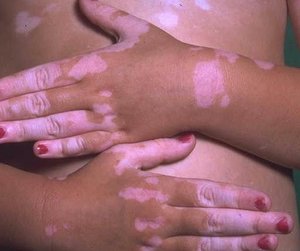The face is the part of the body we protect. Appearance is everything to most people, and even the thought of disfigurement can cause distress. Unfortunately, I found out just how much distress the real thing can cause.
At 14, I had a beautiful figure, well-shaped legs and a flawless complexion. Boys were beginning to flirt with me. I had begun to see myself as pretty. Then my whole world changed dramatically. I woke up one morning to discover that I had lost pigment from both my upper and lower lips. I was devastated.
My mother was the first person I shared my grief with. She was like a village pharmacist; you could always go to her to find out what ailed you. Her gentle touch immediately made me feel better.
"The first thing we'll do is see a doctor," she advised, cautioning me not to panic. But the appointment and the diagnosis that followed ushered in a new phase of my life: I had vitiligo. I would have to live with disfigurement.
Vitiligo occurs in about 2 percent of the world's population and usually begins as small white patches on parts of the body that are exposed to the sun. These spots may enlarge and then merge with one another. While the cause of vitiligo is unknown, the condition can run in families. I was disappointed to learn that once skin pigment has been lost there is very little chance of its ever returning.
When a disease like vitiligo strikes, you pray for a cure or a treatment that can make your life return to the way it was. But there were no easy answers. I feared that I would have to suffer the stares and discomfort of others around me for the rest of my life.
I had just begun my second year of high school, and adjusting to my new life as a teenager had brought its own ups and downs. But vitiligo would change me in more ways than I could fathom. The activities we perform each day--waking up, washing our faces, brushing our teeth, getting dressed--seem routine. But they no longer were for me. Each morning I had to confront anew what I saw as my abnormality. I felt that fate had singled me out for cruel and unusual punishment.
Fortunately, I found that cosmetic remedies were available that would make me feel less self-conscious. One day the secretary of my high school confided to me that her niece also suffered from vitiligo. She sensed my frustration and pain and suggested that I try using makeup to darken the areas where my pigment was missing. I took her advice and began to look for other cosmetics I could use.
I gradually grew more comfortable with my condition. Eating in public was difficult, but I could do it. Drinking was worse because my makeup might come off, especially if I couldn't straw.
My years entering adulthood were painful. And even now, many years later, I still shrink from socializing. Many people are uncomfortable around me, while others tend to be condescending and too accommodating. But I have learned to respect the way they feel.
I know that my life has been struck by tragedy. It is not only diseases like cancer, diabetes and AIDS that have tragic consequences. Vitiligo, while not deadly to the body, damages the spirit. It leaves hidden grief and a battered interior. I have cried a river of tears. I have even thought of committing suicide.
It has taken me more than 30 years to have the courage to share my pain publicly. Maybe some of the burden I carried would have been alleviated had I shared my feelings, but I never wanted to subject others to my pain.
But I have become stronger. I have learned to focus my life. I have developed an inner courage that does not allow me to wallow in self-pity. I now recognize my strengths and look for life's beauty.
The answer to my pain has been to give to others. I share what I have with those who are needy, and I have reaped benefits and rewards. Time has allowed me to see how God can use misfortune to help us transform our lives and to become sensitive to the needs of others.
Pauline Martell-Smith originally from Jamaica and the mother of three children, lives in Texas. For more on vitiligo, contact the National Vitiligo Foundation, P.O. Box 6337, Tyler TX 75711.
COPYRIGHT 1997 Essence Communications, Inc.
COPYRIGHT 2004 Gale Group




